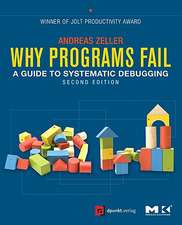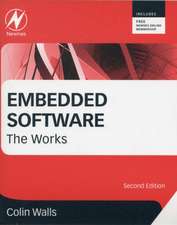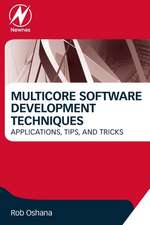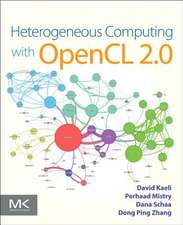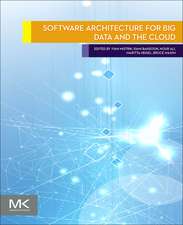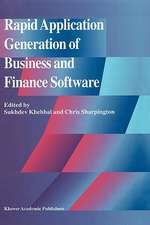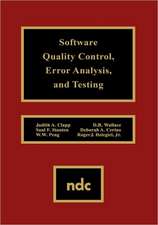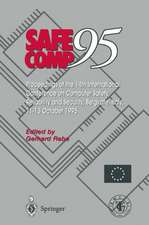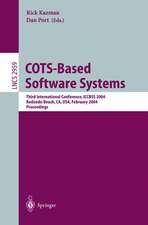Managing Trade-offs in Adaptable Software Architectures
Editat de Ivan Mistrik, Nour Ali, Rick Kazman, John Grundy, Bradley Schmerlen Limba Engleză Paperback – 11 aug 2016
This comprehensive resource brings together research focusing on how to manage trade-offs and architect adaptive systems in different business contexts. It presents state-of-the-art techniques, methodologies, tools, best practices, and guidelines for developing adaptive systems, and offers guidance for future software engineering research and practice.
Each contributed chapter considers the practical application of the topic through case studies, experiments, empirical validation, or systematic comparisons with other approaches already in practice. Topics of interest include, but are not limited to, how to architect a system for adaptability, software architecture for self-adaptive systems, understanding and balancing the trade-offs involved, architectural patterns for self-adaptive systems, how quality attributes are exhibited by the architecture of the system, how to connect the quality of a software architecture to system architecture or other system considerations, and more.
- Explains software architectural processes and metrics supporting highly adaptive and complex engineering
- Covers validation, verification, security, and quality assurance in system design
- Discusses domain-specific software engineering issues for cloud-based, mobile, context-sensitive, cyber-physical, ultra-large-scale/internet-scale systems, mash-up, and autonomic systems
- Includes practical case studies of complex, adaptive, and context-critical systems
Preț: 459.97 lei
Preț vechi: 574.97 lei
-20% Nou
Puncte Express: 690
Preț estimativ în valută:
88.03€ • 91.56$ • 72.67£
88.03€ • 91.56$ • 72.67£
Carte tipărită la comandă
Livrare economică 07-21 aprilie
Preluare comenzi: 021 569.72.76
Specificații
ISBN-13: 9780128028551
ISBN-10: 0128028556
Pagini: 430
Dimensiuni: 191 x 235 x 27 mm
Greutate: 0.74 kg
Editura: ELSEVIER SCIENCE
ISBN-10: 0128028556
Pagini: 430
Dimensiuni: 191 x 235 x 27 mm
Greutate: 0.74 kg
Editura: ELSEVIER SCIENCE
Cuprins
1. Managing Trade-Offs in Adaptable Software Architectures
Part I: Concepts and Models for Self-Adaptive Software Architectures
2. Architecting Software Systems for Runtime Self-Adaptation: Concepts, Models, and Challenges
3. A Classification Framework of Uncertainty in Architecture-Based Self-Adaptive Systems With Multiple Quality Requirements
4. An Architecture Viewpoint for Modeling Dynamically Configurable Software Systems
5. Adaptive Security for Software Systems
Part II: Analyzing and Evaluating Trade-Offs in Self-Adaptive Software Architectures
6. Automated Inference Techniques to Assist With the Construction of Self-Adaptive Software
7. Evaluating Trade-Offs of Human Involvement in Self-Adaptive Systems
8. Principled Eliciting and Evaluation of Trade-Offs When Designing Self-Adaptive Systems Architectures
9. Analyzing the Architectures of Software-Intensive Ecosystems
10. Architectural Perspective for Design and Analysis of Scalable Software as a Service Architectures
Part III: Managing Trade-Offs in Self-Adaptive Software Architectures
11. Managing Trade-offs in Self-Adaptive Software Architectures: A Systematic Mapping Study
12. The Many Facets of Mediation: A Requirements-Driven Approach for Trading Off Mediation Solutions
Part IV: Quality Assurance in Self-Adaptive Software Architectures
13. An Overview on Quality Evaluation of Self-Adaptive Systems
14. Identifying and Handling Uncertainties in the Feedback Control Loop
Part I: Concepts and Models for Self-Adaptive Software Architectures
2. Architecting Software Systems for Runtime Self-Adaptation: Concepts, Models, and Challenges
3. A Classification Framework of Uncertainty in Architecture-Based Self-Adaptive Systems With Multiple Quality Requirements
4. An Architecture Viewpoint for Modeling Dynamically Configurable Software Systems
5. Adaptive Security for Software Systems
Part II: Analyzing and Evaluating Trade-Offs in Self-Adaptive Software Architectures
6. Automated Inference Techniques to Assist With the Construction of Self-Adaptive Software
7. Evaluating Trade-Offs of Human Involvement in Self-Adaptive Systems
8. Principled Eliciting and Evaluation of Trade-Offs When Designing Self-Adaptive Systems Architectures
9. Analyzing the Architectures of Software-Intensive Ecosystems
10. Architectural Perspective for Design and Analysis of Scalable Software as a Service Architectures
Part III: Managing Trade-Offs in Self-Adaptive Software Architectures
11. Managing Trade-offs in Self-Adaptive Software Architectures: A Systematic Mapping Study
12. The Many Facets of Mediation: A Requirements-Driven Approach for Trading Off Mediation Solutions
Part IV: Quality Assurance in Self-Adaptive Software Architectures
13. An Overview on Quality Evaluation of Self-Adaptive Systems
14. Identifying and Handling Uncertainties in the Feedback Control Loop
Recenzii
Contributions Include:
· Norha M. Villegas (Universidad Icesi, Colombia) discusses architecting software systems for runtime self-adaptation: concepts, models, instrumentation and challenges
· Mohamed Almorsy Abdelrazek (Deakin University, Australia) explores adaptive security for software systems
· Sam Malek (University of California, Irvine, USA) delves into automated inference techniques to assist with construction of adaptable software architectures
· Javier Camara (Carnegie Mellon University, USA) evaluates trade-offs of human involvement in self-adaptive systems
· Maria Salama (University of Birmingham, UK) presents a systematic mapping study on managing trade-offs in self-adaptive architectures
· Amel Bennaceur (The Open University, UK) examines the many facets of mediation: a requirements-driven approach for trading-off mediation solutions
· Claudia Raibulet (University of Milano-Bicocca, Italy) proposes an overview of quality evaluation mechanisms for self-adaptive systems
Plus Forewords from:
· David Garlan (Carnegie Mellon University, USA)
· Nenad Medvidovic (University of Southern California, USA) on the Golden Age of software architecture, that continues on in finding solutions to the problem of how quality trade-offs are managed in adaptable software architectures.
· Paris Avgeriou (University of Groningen, Netherlands) on the current problems and potential solutions in managing tradeoffs of quality attributes in self-adaptive architectures
· Rogerio De Lemos (University of Kent, UK)
And much more...
· Norha M. Villegas (Universidad Icesi, Colombia) discusses architecting software systems for runtime self-adaptation: concepts, models, instrumentation and challenges
· Mohamed Almorsy Abdelrazek (Deakin University, Australia) explores adaptive security for software systems
· Sam Malek (University of California, Irvine, USA) delves into automated inference techniques to assist with construction of adaptable software architectures
· Javier Camara (Carnegie Mellon University, USA) evaluates trade-offs of human involvement in self-adaptive systems
· Maria Salama (University of Birmingham, UK) presents a systematic mapping study on managing trade-offs in self-adaptive architectures
· Amel Bennaceur (The Open University, UK) examines the many facets of mediation: a requirements-driven approach for trading-off mediation solutions
· Claudia Raibulet (University of Milano-Bicocca, Italy) proposes an overview of quality evaluation mechanisms for self-adaptive systems
Plus Forewords from:
· David Garlan (Carnegie Mellon University, USA)
· Nenad Medvidovic (University of Southern California, USA) on the Golden Age of software architecture, that continues on in finding solutions to the problem of how quality trade-offs are managed in adaptable software architectures.
· Paris Avgeriou (University of Groningen, Netherlands) on the current problems and potential solutions in managing tradeoffs of quality attributes in self-adaptive architectures
· Rogerio De Lemos (University of Kent, UK)
And much more...

